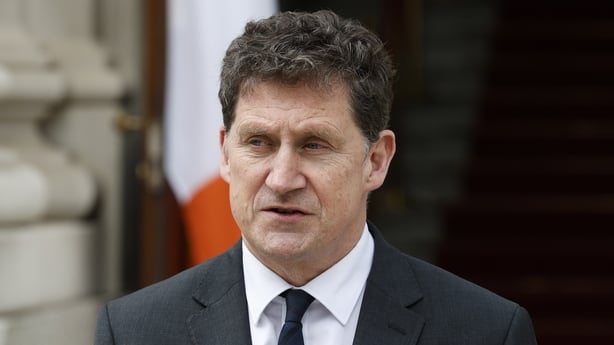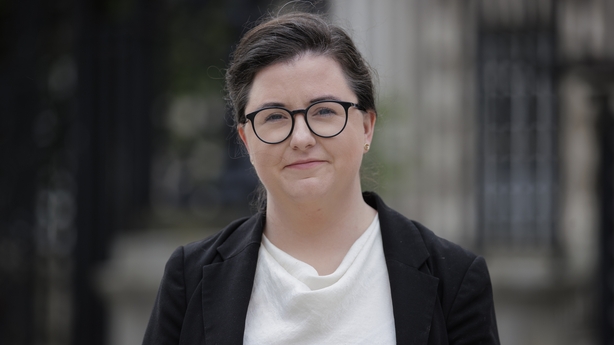A judge has ruled that provisions of the UK's Illegal Migration Act should be disapplied in Northern Ireland, as they undermine human rights protections guaranteed in the region under post-Brexit arrangements.
Mr Justice Humphreys also said aspects of the Act were incompatible with the European Convention on Human Rights (ECHR).
The post-Brexit Windsor Framework jointly agreed by the UK and EU includes a stipulation that there can be no diminution of the rights provisions contained within the Good Friday Agreement of 1998.
The Illegal Migration Act provides new powers for the British government to detain and remove asylum seekers it deems to have arrived illegally in the UK.
Central to the new laws is the scheme to send asylum seekers to Rwanda.
Mr Justice Humphreys delivered judgment at Belfast High Court in two challenges against the Act that focused on the peace process human rights protections guaranteed by the Windsor Framework.
The judge found that several elements of the Act do cause a "significant" diminution of the rights enjoyed by asylum seekers residing in Northern Ireland under the terms of the Good Friday Agreement.
"I have found that there is a relevant diminution of right in each of the areas relied upon by the applicants," he said.
He added: "The applicants' primary submission therefore succeeds. Each of the statutory provisions under consideration infringes the protection afforded to RSE (Rights, safeguards and equality of opportunity) in the Good Friday Agreement."
The judge ruled that the sections of the Act that were the subject of the legal challenges should be "disapplied" in Northern Ireland.
He also declared aspects of the Act incompatible with the ECHR.
One of the cases was taken by the Northern Ireland Human Rights Commission and the other by a 16-year-old asylum seeker from Iran who is living in Northern Ireland having arrived in the UK as an unaccompanied child.
The boy, who travelled from France by small boat and claimed asylum in July 2023, has said he would be killed or sent to prison if he returned to Iran.
The judge agreed to place a temporary stay on the disapplication ruling until another hearing at the end of May, when the applicants will have an opportunity to respond to the judgment.
Downing Street said the UK government would challenge the High Court ruling on the Act, but insisted the timetable for sending asylum seekers to Rwanda would not be affected.
Prime Minister Rishi Sunak's official spokesman said: "This judgment doesn't affect our operational plans to send illegal migrants to Rwanda or the lawfulness of our Safety of Rwanda Act.
"We continue to work on the timetable that the prime minister had previously set out."
He added that the government has "consistently been clear that the commitment to the Good Friday Agreement should be interpreted as they were always intended and not expanded to cover issues like illegal migration".
"We will take all steps to defend that position including through appeal," he said.
Dr Tony McGleenan KC, representing the British government, had earlier indicated that an appeal may be considered.

Meanwhile, Minister for Environment, Climate and Communications Eamon Ryan said the Government would have read the Northern Ireland judgment and "assess what implications it has".
Speaking on RTÉ's News at One, Mr Ryan said: "It is primarily a matter for the UK government.
"In terms of how their Illegal Migration Act applies, but obviously because we have an open border because we have the Common Travel Agreement, we have to work in consultation with them to make sure that we have an effective and fair system."
He added that more work was needed in the Republic to provide more emergency accommodation and "continue to amend the terms or the arrangements that apply, so we can manage it fairly and effectively".
He said there will be a Cabinet discussion on the issue tomorrow, adding there will be variations and changes made, but this will be with the "knowledge that the Government must offer additional accommodation to those seeking international protection".
Immigration solicitor Sinéad Marmion, who represented the teenage Iranian asylum seeker applicant, said the judgment was "hugely significant" as it suggested if asylum seekers impacted by the Act made their way to Northern Ireland from the UK, they could not be sent to Rwanda.
However, she imagined the British government would appeal the outcome.
"It is a flagship policy of the current British government. It is to prevent asylum claims and to turn their back on refugee protection... This is a huge problem for them," she said.
Speaking on News at One, Ms Marmion said the teenager was concerned that under the Illegal Migration Act when he turned 18, he would be removed.
"And any connection that he had to Northern Ireland, or his carers here would all be severed, and it would leave him in a very precarious future for him," she said.

She explained that although the boy entered the UK via Kent, he came to Northern Ireland through the National Transfer Scheme.
He made an asylum claim, but his claim was deemed "inadmissible" because of how he entered the UK, she said.
Ms Marmion said: "There is a duty on the secular state to remove him upon reaching his 18 years because they would deem it as an inadmissible claim.
"So, whilst he has made the asylum claim, the government explicitly have said that under the Act and under their new policies, that they would not be actually processing the claim, and they would deem it as inadmissible because of how he actually arrived into the UK."
Ms Marmion said that article two of the Windsor framework outlines that there shall be no diminution of rights as a result of Brexit.
"We were saying that basically, this new legislation reduced the rights of those people claiming asylum in the UK because they were a diminution from what EU law protections that are in place," she said.
"So, the ability to actually make an asylum claim, for example, for unaccompanied minors, it does not matter where someone has been or how they arrive, the member state in which they present themselves as a minor, the state actually has to determine that claim and cannot deem it as inadmissible," she added.
Ms Marmion said the judgment would prevent the Rwanda scheme applying in Northern Ireland.
"This is a huge thorn in the government's side and it has completely put a spanner in the works," she told the PA news agency.
"There's a huge obstacle in the way of them being able to actually implement that in Northern Ireland now, as it's been found to be incompatible with the Windsor Framework," she added.

